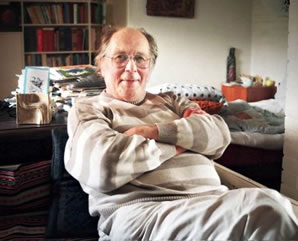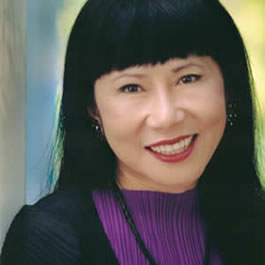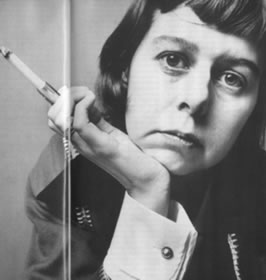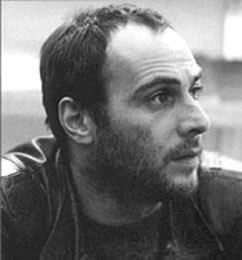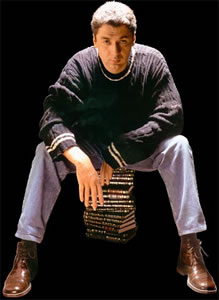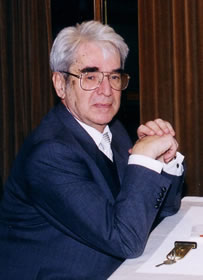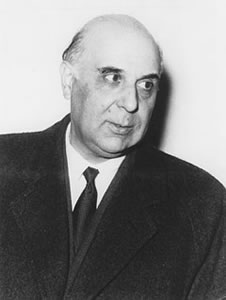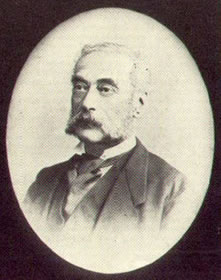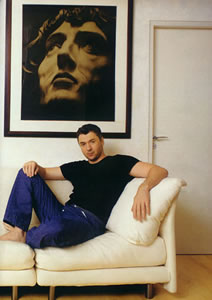De Nederlandse schrijver Michiel Stroink werd geboren in Oss op 19 februari 1981. Zie ook alle tags voor Michiel Stroink op dit blog.
Uit: Exit
“Ze onderging de gedaanteverwisseling in een fractie van een seconde. Haar gebruikelijke, frivole gefladder sloeg als een bromvlieg tegen het raam te pletter, en terwijl ik me afvroeg wie ik het beste kon bellen om een terrasje mee te pakken, gooide ze het eerste voorwerp naar mijn hoofd. Het was de donkerblauwe koffiemok die ik om de een of andere reden nooit had weggegooid. Ik overwoog het iedere verhuizing, maar het lukte me niet. De mok was een cadeautje van mijn vader. Een ruim twintig jaar oud souvenir. De mok miste mijn hoofd en viel vier verdiepingen lager in de tuin van het kinderdagverblijf in honderdduizend doodsoorzaken voor kruipende baby’s uit elkaar. De mok was het enige object in het appartement dat echt van mij was. Alle mierzoete Ikea-confectiemeuk waarmee het is ingericht heeft ze zorgvuldig bij elkaar gezocht. Alsof de reclamefolder bij ons op de vloer een miskraam heeft gehad. Merkstoelen die nagebraakt zijn door talentloze ontwerpers en gemaakt door incomplete kinderhandjes uit Bangladesh. Het was me niet eerder opgevallen dat ik ruim vier jaar in BARBIE’S DREAMHOUSE © voor amateurvolwassenen heb gewoond. Eigenlijk was ik meer een bezoeker. Verlaat de gevangenis zonder te betalen.
Ze zocht de mok bewust uit, en daarom weet ik zeker dat de waanzin gespeeld was. En omdat ik wel van een spelletje houd, leek het me leuk om nog wat olie op het vuur te gooien. `Gefeliciteerd,’ zei ik zo kalm mogelijk. ‘Nu ben je dus eindelijk echt krankzinnig geworden.’ Lizes geestesgesteldheid is haar achilleshiel. Ze loopt al jaren bij een psycholoog, en daar mogen geen grapjes over worden gemaakt. Maar nu was het nodig, ze had tenslotte mijn lievelingsmok kapotgegooid. En ik presenteerde de woorden — mijn rode lap — als een matador: met een kleine buiging. Respecteer je tegenstander alleen als je zeker weet dat je gaat winnen. Voor nieuwe ammunitie stampte ze naar de keuken. Ik was hem helemaal vergeten, maar de inboedel herbergde inderdaad nog een item dat mij toebehoorde: een oude stereotoren. Een tijdje terug had ik die nog willen weggooien, maar hij was zo vet en stoffig dat ik me direct bedacht.
Omdat ruziemaken een gezamenlijke activiteit is, liep ik gemoedelijk achter Lize aan. Ik hield mijn handen bewust in de zakken van mijn trainingsbroek, omdat dat de lusteloze uitstraling die ze zo haat versterkt. Terwijl ze de micro-stereotoren oppakte, ontdekte ze dat de stekker nog in het stopcontact zat. Met veel gevoel voor drama rukte ze die los en liet in één moeite door de nooit-gelezen Jamie Olivers op de plastic zwart-wit geblokte keukenvloer vallen. De vettige stereotoren boven haar hoofd gaf haar even iets vertederends. Lizes bovenkamer heeft het niet makkelijk. Er wonen drie puppy’s, die het zelden met elkaar eens zijn. Ze kunnen nooit alle drie tegelijkertijd rustig zijn, en als ze elkaar totaal hebben opgefokt, is ze helemaal een ongeleid projectiel.”

Michiel Stroink (Oss, 19 februari 1981)
De Amerikaanse schrijfster en essayiste Siri Hustvedt werd geboren op 19 februari 1955 in Northfield, Minnesota. Zie ook alle tags voor Siri Hustvedt op dit blog.
Uit: A Woman Looking at Men Looking at Women
“A woman novelist, on the other hand, is in double trouble. If she writes imaginary stories, such soft stuff is made all the softer by her female identity, and if she writes about her own experience in a memoir of domestic life, about the trials of having and caring for babies and children, about boring encounters with fellow parents at the daycare center or nursery school, about her peevish irritations and grievously lost independence, she may well vanish without a trace or be relegated to the ghetto that is woman’s writing. Then again, she may not. The reception of fiction is fickle. If publishers could recognize success in manuscript form, publishing would be a very different business. Because I write fiction and nonfiction and have an abiding interest in neurobiology and philosophy (still mostly male disciplines), I embody the masculine/feminine, serious/not-so-serious, hard/soft divide in my own work. When I publish a paper in a science journal or lecture at a conference in the sciences, I find myself on male terrain, but when I publish a novel, I stay squarely in female land. The audiences at public events vary accordingly, from about 80 percent male in the sciences and philosophy to exactly the reverse at a literary reading or event. This gendered geography becomes the context for one’s work and for its perception. Where exactly does competition come in? Undisguised competition in the form of verbal sparring, one-upmanship, and the blow-by-blow dismantling of a paper are common in the sciences and philosophy, and they are certainly not unheard of in the humanities. I once gave a lecture on trauma and literature at the Sorbonne in Paris, and the questions came hard and fast once I had finished speaking. I loved it. For one thing, in these worlds, knowledge counts. The more you know, the better off you are, and I revel in the lively combat of ideas that takes place in these sequestered but intense worlds of the intellect. Further, I have learned a lot from such robust encounters. I have had my mind changed by them. Fighting about ideas is fun, and if you really know your stuff, instant respect may be granted and offers to share papers and perhaps engage in an email dialogue soon follow.”

Siri Hustvedt (Northfield, 19 februari 1955)
De Amerikaanse schrijver Jonathan Allen Lethem werd geboren op 19 februari 1964 in Brooklyn, New York. Zie ook alle tags voor Jonathan Lethem op dit blog.
Uit: A Gambler’s Anatomy
“It was there when he woke up. Presumably also when he slept. The blot. Standing alone at the back of the sparsely populated ferry to Kladow, mercifully sheltered behind safety glass against the chill of the lake at evening, Alexander Bruno could no longer deny the blot that had swollen in his vision and was with him always, the vacancy now deforming his view of the receding shore. It forced him to peer around its edges for glimpses of the mansions and biergartens, the strip of sand at the century-old lido, the tarpaulined sailboats. He’d come to Berlin, half the circumference of the world, two weeks ago, whether to elude his fate or to embrace it he couldn’t know.
He’d been biding his time in Charlottenburg, breakfasting at the quiet cafés, watching the days grow steadily longer, overhearing more spoken English than he’d have preferred, running through his last funds. His tuxedo had remained in its hanging bag, his backgammon case latched. All the while the blot had been with him, unacknowledged. Bruno its carrier, its host. He’d passed through customs with the innocence of the accidental smuggler: Nothing to declare. It was only after having at last called the number provided him by Edgar Falk and consenting to visit the rich man’s house in Kladow, only upon his waking, this very day on which he’d dusted off tuxedo and backgammon case, that the blot had insisted he grant its existence. An old friend he’d never met but recognized nevertheless.
Why get too fancy about it? He might be dying.
Under the circumstances of Bruno’s dread, the slide of the S-Bahn through the endless roster of stations from Westend to Wannsee had seemed as long as his voyage from Singapore to Berlin. The German city, with its graffiti and construction sites, its desultory strips of parkland and naked pink water pipes, had its own sprawl and circumference. Berlin wended through time. On the S-Bahn toward Wannsee the tall girls in black leggings with bicycles and earbuds, so prevalent in Charlottenburg and Mitte, had thinned out, replaced by dour Prussian businessmen and staring grandmother types, slouching home with briefcases and shopping bags. By the time of the ferry there was little to defeat the irresistible illusion that the city was newly vanquished and carved into sectors, that the prevailing silence and gloom derived from remorse and privations not seventy years past but fresh as smoldering rubble.”

Jonathan Lethem (New York, 19 februari 1964)
De Engelse schrijfster Helen Fielding werd geboren in Morley, Yorkshire op 19 februari 1958. Zie ook alle tags voor Helen Fielding op dit blog.
Uit: Bridget Jones’ baby, de dagboeken (Vertaald door Titia Ram)
“Maandag 13 november
10.15 uur.
Studio van Sit Up Britain. Net op mijn werk gearriveerd. Ik kan dit niet. Ik kan absoluut geen
hele dag werken met de volgende dingen in mijn lijf:
1) Steeds groter wordende baby die gebakken aard-ppels, kaas, augurken en – ineens – wodka wil.
2) Volledig verward en gebroken hart. Waarom heeft Mark me die brief geschreven? Terwijl het
er juist allemaal zo lieflijk aan toeging toen we in de auto terug van Grafton Underwood zaten?
Waarom? Wat is er gebeurd? Waarom reageert hij niet op mijn sms’jes? Misschien vindt hij me
echt een ordinaire slet en herinnert Daniel hem aan het deel van mij dat hij niet leuk vindt.
Onder mijn bureau stiekem Tom gefacetimed.
‘Je bent niet ordinair en je bent geen slet,’ zei Tom op FaceTime. ‘Je bent een succesvolle nieuwsproducer en je leeft zo ongeveer als een non. Je moet even een spelletje Maar… tenminste doen. Weet je nog? Wat je hebt voorgedaan toen ik werd gekweld door Pretentieuze Jerome? Maar… tenminste? Maar… ik heb tenminste nog dit of dat. Voelt dat beter?’
‘Ja! Ja!’ zei ik, en ik voelde me helemaal opgefleurd.
‘Dank je, Tom.’
Klikte FaceTime uit.
FaceTime sprong weer tevoorschijn: Tom.
‘Bridge, dat je het even weet: je kunt beter geen mensen facetimen vanuit die hoek.’
Tom verdween en plopte vervolgens weer in beeld:
‘Ben ik een vreselijk mens?’
‘Bridget, ga eens wat doen,’ zei Richard Finch, die langs mijn bureau kwam lopen en naar mijn borsten gluurde.
Stuurde snel een sms naar Tom: ‘Nee, goed mens,’ waarna ik als een bezetene begon te typen en geconcentreerd naar het beeldscherm tuurde. Het leek net of ik heel hard aan het werk was.”

Helen Fielding (Morley, 19 februari 1958)
Cover
De Estlandse schrijver Jaan Kross werd geboren op 19 februari 1920 in Tallin. Zie ook alle tags voor Jaan Kross op dit blog.
Uit: Tussen drie plagen (Vertaald door Frans van Nes en Jesse Niemeijer)
“Komt dat zien! Komt dat zien! Een mirakel zoals u nog nooit gezien hebt. Een mirakel dat u maar één keer in uw leven kunt aanschouwen!’ Een knaap met wat dons op de kin, een kwajongen nog met zijn neus nat van het zweet en met felle grote ronde ogen, rukte een vuurrode hoed met een vergulde band van zijn warrige haardos. In één beweging veegde hij met zijn gerafelde mouw de zweetdruppels van zijn neus en liet hij zijn rood-gouden hoed een machtige boog door de blauwe lucht maken. `Ein ersam rad! Schiine frawn! Tichtig junkfer!3 Metselaars en schoenmakers! Haast u! Komt het zien!’ Eigenlijk hoefde de heraut niet langer zo schril in drie talen te schreeuwen en met zijn hoed omhoog te wijzen. Want al het volk dat zich door de Grote Zeepoort in de richting van de Lijnbaansheuvel wurmde, staarde toch al met halftoegeknepen ogen naar de wolkeloze voorjaarshemel. Midden in de drom mensen die uit de Zeepoort stroomde, liep raadsheer Vegesack met rode wangen, die in zijn haast zijn waardigheid vergat, en zelfs zijn verlepte vrouw naast hem had blosjes op haar wangen. Er liepen nog meer raadsheren met hun vrouwen, kooplieden en winkeliers, ambachtslieden met bierbuiken en hun sproetige gezellen, opgewonden burgermeisjes en hun voorname moeders, flinke dienstmaagden, raadssoldaten in blauwe wambuizen en grijs werkvolk. En alle mensen staarden voortdurend omhoog, ze draaiden hun halzen naar links. Verder naar rechts denderde een troep matrozen uit Lbeck met zo veel geweld over een loopplank dat die ervan kraakte. Ook voor de matrozen was dit een eenmalig gebeuren. Aan de linkerkant haastte het volk uit Kalamaja zich in groepjes de Lijnbaansheuvel omhoog met een gigantische stofwolk op hun hielen. En toen het volk uit de poort ver genoeg over de brug over de gracht was om de puntgevels van de buitenste stadshuizen boven de stadsmuur te kunnen zien, zagen ze dat alle dakluiken openstonden en dat daarvandaan talloze wijd opengesperde ogen naar de hemel staarden. De knechten van één koopmanshuis waren zelfs met z’n drieën op een hijsbalk geklauterd en zaten daar op een rijtje als dorpsjongens op een hek. Ze keken zelf naar de lucht terwijl ze met hun benen boven de peilloze diepte schommelden; op ieder ander moment was het doodeng geweest om ze zo te zien zitten.“

Jaan Kross (19 februari 1920 – 27 december 2007)
De Duitse schrijfster, regisseuse en actrice Helene Hegemann werd geboren in Freiburg im Breisgau op 19 februari 1992. Zie ook alle tags voor Helene Hegemann op dit blog.
Uit: Bungalow
“Ich war siebzehn, wir durften das Haus nicht verlassen wegen Ozonwarnung, Hitzefrei für Erwachsene, mir gefiel das immer, obwohl die Strahlung uns draußen nach fünf Minuten mit blauer Haut und Tränen in den Augen in die Knie gezwungen hätte. Den ganzen Tag rummachen bei geschlossenen Vorhängen und »University Challenge« streamen, eine Sendung, in der die besten Studenten britischer Eliteuniversitäten Fragen zu antiker Architektur oder dem Aufbau des endo plasmatischen Retikulums oder der Sonatenhauptsatzform beantworten müssen und die vor zehn Jahren abgesetzt wurde, alles wie immer, aber an diesen Tag erinnere ich mich besser als an andere. Mein Oberkörper liegt auf der Waschmaschine, Georg steht hinter mir, ich trage die horizontal gestreifte Strickjacke, in der Maria normalerweise den Müll wegbringt, und muss an das Blut und die Hautfetzen denken, die nach dem Scheren der Merinoschafe in ihrer Wolle hängen bleiben, daran, wie man Schafe ins Gesicht schlägt, um ihren Widerstand zu brechen. Maria hängt zu dem Zeitpunkt kiffend auf dem Sofa, die Tür steht offen. Ihr ist langweilig. Mir auch. Ihm auch, obwohl er kurz davor ist, zu kommen. Ich drehe mich um und schubse ihn weg, das ist weder Intuition noch ein klarsichtig gesteuerter Akt sexuellen Einfallsreichtums, einfach was Überlebenswichtiges, zu dem ich mich überwinden muss. Er stolpert über seine Hose, anthrazitgrau, die doppelt paspelierte Arschtaschen hat und ihm in den Kniekehlen hängt. Dann knallt er mit dem Hinterkopf an die Holzregale. Ich lege meine Hände um seinen Hals und meine Daumen auf die Stelle zwischen den Schlüsselbeinen, dorthin, wo die Kehle beginnt. Für zwei Sekunden ist er ohnmächtig. Ich knie auf seinen Oberschenkeln. Vielleicht habe ich ihn umgebracht. Als er die Augen wieder öffnet, sieht er mich genauso an wie früher, ganz früher, als ich ihm mit elf zum ersten Mal »Guten Tag« gesagt und an seinem Ausdruck festgestellt habe, dass er irgendwas interessant an mir findet. Ich ging nicht davon aus, dass er es mochte, keine Luft mehr zu kriegen. Ich habe das auch nie wieder gemacht. Also, ihn würgen. Wäre vergleichbar mit einem Stück Schwarzwälder Kirschtorte gewesen, von dem er seiner Tante irgendwann mal höflichkeitshalber gesagt hat, es würde ihm schmecken, und dann kriegt er das sein Leben lang bei jedem Besuch serviert. Es ging da nicht um die Abwandlung irgendeiner Routine, nur darum, dass Maria wegen uns den Fernseher ausmachen sollte. Sie machte ihn aus. Wir waren zufrieden.”

Helene Hegemann (Freiburg im Breisgau, 19 februari 1992)
De Duitse dichter en schrijver Björn Kuhligk werd geboren op 19 februari 1975 in Berlijn. Zie ook alle tags voor Björn Kuhligk op dit blog.
Uit: Die Sprache von Gibraltar
Prolog des Affen
Churchill hat uns nachgeholt
wir sind legal, Großbritanniens Garantie
meine Herkunft: von der anderen
Seite, ich bin für keinen Feind
eroberbar, ich bin der Weltschmerz
auf dem Fels, ich bin, woraus ihr
kommt, ich laufe über eure Autos
ich bin der Spott, der Hohn, und hocke
auf dem Fels, ich sehe die Schmuggler
Flugzeuge starten und landen, das Geld
das sich allein bewegt, ich bin euch
Zumutung, das Wrack, das ihr streichelt
ich sitze auf dem Fels und seh Besitz
und hör die Kontinente driften.
1
Am Tag, an dem die ersten Blütenblätter
der Lilien auf den Wohnzimmertisch fallen
an einem Montag der Unruhe
fliege ich an die Grenze Europas
mit 520 km/h in 4000 Meter Höhe
überquere ich um siebzehn Uhr fünfzehn
in einem nicht fassbaren Zustand
mit einer Erkältung, die eine Angst ist
den 36. Breitengrad, die Sonne ballert
das Ende Europas, Europas Ende
die Möwen mit ihren Möwenhirnen
die Affen mit ihren Affenhirnen
wissen nichts davon, wir sind die Minderheit
die Lebenden, das Ende Europas ist da
wo der Anfang Afrikas ist, dort draußen
auf dem Wasser, in Sichtweite

Björn Kuhligk (Berlijn, 19 februari 1975)
De Duitse dichter en schrijver Thomas Brasch werd geboren in Westow,Yorkshire (Engeland) op 19 februari 1945. Zie ook alle tags voor Thomas Brasch op dit blog.
Uit: Vor den Vätern sterben die Söhne
“Robert schob ihm das Kissen unter den Kopf und deckte ihn zu. Dann ging er zur Tür.
Ich kann ihm auch nicht helfen. Warum sollte ich dableiben. Irgendwo muß dieser verdammte Fahrstuhl gewesen sein.
Suchen Sie jemand, hörte Robert hinter sich eine Stimme.
Die grauhaarige Frau stand in der Wohnungstür und trocknete sich die Hände an einem Geschirrtuch ab.
Ich wollte zu Herrn Werner.
Von dort kommen Sie doch gerade, oder?
Ich habe vielleicht das Schild übersehen. Vielleicht habe ich den Namen falsch gelesen.
Die Frau schob das Geschirrtuch unter ihre Schürze.
Was wollen Sie denn von Herrn Werner.
Ich soll ihm was bringen, von seiner Schwester.
Sie trat einen Schritt auf ihn zu.
Was denn, eine Schwester hat der? Das kann doch nicht wahr sein. Das ist der Gipfel. Die sollte lieber mal selber kommen, statt jemanden herzuschicken. Ihr Bruder machts nicht mehr lange, das können Sie ihr sagen. Der ist schon jetzt nicht mehr ganz bei sich. Hier oben, meine ich. Den ganzen Tag marschiert er im Stechschritt durchs Zimmer. Oder er holt fremde Leute in die Wohnung. Jetzt hat er auch noch angefangen, nachts zu singen. Singen, was sage ich. Er krächzt. Und plötzlich stellt sich heraus, er hat eine Schwester. Sagen Sie ihr mal, sie soll … Robert drehte sich um und ging zurück.“

Thomas Brasch (19 februari 1945 – 3 november 2001)
Scene uit een opvoering van het gelijknamige theaterstuk in Dessau, 2013
De Russische schrijver Dmitri Lipskerov werd geboren op 19 februari 1964 in Moskou. Zie ook alle tags voor Dmitri Lipskerov op dit blog.
Uit: Léonid doit mourir (Vertaald door Raphaëlle Pache)
“Au vingt-sixième jour, le coeur se mit à battre.
Le petit amas de cellules, accroché Dieu sait comment à la chair, palpitait déjà en continu, prêt à se décrocher d’un instant à l’autre pour être emporté par un flot de liquides dans le Tartare. Et voilà que le coeur, cette pompe puissante qui envoyait on ne savait trop quoi ni où pour le moment, rendait encore plus problématique le développement futur de l’embryon.
Toutefois, ce n’était qu’un danger abstrait perçu de manière floue, d’autant que seul l’embryon avait connaissance de sa propre existence. Comment quelques centaines de cellules pouvaient-elle détenir cette information ? Pas moyen de l’expliquer de manière humaine, rationnel le. Pourtant, les opposants à l’avortement affirment que dès sa première seconde d’existence, le foetus est capable de pressentir très nettement l’approche de son exécution – son évacuation forcée de l’utérus -et qu’il en éprouve une souffrance insupportable. Mais comment est-ce possible sans matière grise, autrement dit sans vecteur de la pensée et par conséquent de la peur ? Voilà qui échappe à l’entendement. Pourtant les faits sont irréfutables : la souffrance éprouvée par le produit d’un accouplement récent est bel et bien insupportable, de même que le fruit de cet accouplement peut parfois s’avérer monstrueux, réduisant à néant la pâte divine dont l’homme est issu. Les sceptiques ne voient là que des sornettes, à quoi leurs adversaires – des femmes pour la plupart – exigent qu’on leur explique alors comment s’engendre la vie. C’est une question sans réponse, et tous comprennent qu’elle le restera jusqu’à la fin des temps, si bien qu’ennemies et partisans de l’avortement se séparent toujours fâchés à mort.
Cela étant, les premières ont raison, même s’il y a parmi elles nombre de créatures extrêmement désagréables et même pas mères, virulentes jusqu’à rechercher le coup de poing et perdant souvent toute féminité dans la bagarre. Mais que va-t-on se soucier des apparences ? Le principal n’est-il pas de lutter pour une juste cause ?
Donc au vingt-sixième jour, son coeur se mit à battre et naquit chez lui un semblant de pensée. Qui consistait en ceci : s’il y a une première pensée, il y en a une dernière.
Ce premier raisonnement ne suscita pas d’émotion, parce qu’il entraîna aussitôt une deuxième pensée : nul ne sait si sa fin est proche ou lointaine, et si la dernière pensée n’est pas en fait le début d’un nouvel être doté d’une faculté de pensée alternative. »

Dmitri Lipskerov (Moskou, 19 februari 1964)
Cover Russische uitgave
Zie voor nog meer schrijvers van de 19e februari ook mijn blog van 19 februari 2017 deel 2 en ook deel 3.













